Senate Committee advances gambling bill

On Wednesday, the Alabama Senate Tourism Committee voted to give a favorable report to a constitutional amendment allowing gambling establishments in Greene County to have historical horse racing gambling machines. Senate Bill 324 (SB324) is sponsored by State Senate Minority Leader Bobby Singleton (D-Greensboro). “This is a constitutional amendment,” Sing. “By rule 50, this has to be approved in both the Local Legislation Committee and the Tourism Committee. This has to do with “Racing and Parimutuel for Greene County.” “The Greene County Racing Commission asked me to carry this bill,” Singleton said. This will “add in historical horse racing at one or more tracks in the county.” Greenetrack in Greene County has been accused of illegally operating electronic gambling machines. The track unsuccessfully argued in court the machines were actually electronic charity bingo machines. “This bill has nothing to do with bingo in the county at all,” Singleton told the committee. A short public hearing was then held. Drusilla Jackson said, “I basically am in agreement with Senator Singleton with the bill, but the bill I came to ask you about is with the bill dealing with the midwives. This bill needs to be coming back to the floor. We are a rural county. We do not have a hospital that delivers babies in fifty miles.” Sen. Randy Price (R-Opelika) said, “That bill has been sent to Health as I understand it.” Attorney Eric Johnson said, “This bill is a very dangerous bill.” “It is a computer machine that will be doing some kind of historical racing,” Johnson said. “He does not have to pick a race. There is no skill involved in that.” “With this constitutional amendment, Greene County will have unlimited gambling on what they call parimutuel machines.” Stephanie Holden-Smith is the President of the Alabama Policy Institute. President Holden-Smith spoke against the bill, “It actually expands the definition of parimutuel betting.” Singleton said, “We have an attorney general’s opinion that goes back to Attorney General Pryor,” Sen. Greg Albritton (R-Atmore) said, “I am not going to fight or stand in the way, but I have got some statements to make when it gets to the floor.” The Tourism Committee voted to give the bill a favorable report in a 12 to 0 vote. Albritton added, “I would sure be nice if we could get that same vote on a much bigger type of gambling bill.” SB324 could be considered by the full Senate as early as Thursday. Thursday is legislative day 26 of the 2023 Alabama Regular Legislative Session. To connect with the author of this story or to comment, email brandonmreporter@gmail.com.
Legislature could address judge shortage this year Speaker Nathaniel Ledbetter says

The Alabama House of Representatives passed the largest state general fund budget (SGF) in state history on Tuesday. The over three billion SGF has nearly doubled since 2015 when legislators had to raid the state’s savings account – the Alabama Trust Fund – to keep Medicaid afloat and most non-education state agencies operable. Mental Health was cut dramatically in that period, as was maintenance on Alabama’s aging prison infrastructure. Both of those decisions have come with consequences moving forward. One area where those post-Great Recession general fund woes have had an enormous impact is on judges. The state’s population is now over five million. The state’s population has grown by over a million people since 1990, and the number of judges on the bench has not kept up. That growth has not been evenly distributed, however. Thirty-five years ago, Huntsville was a farming community with a military base and a NASA site. Today it is the largest city in the state. Baldwin County has boomed. Elmore, Shelby, Lee, Limestone, St. Clair, Autauga, and Dekalb Counties have all grown in that period at a faster rate than the state as a whole. Subdivisions now stand where cows once grazed. In 2015 judges, especially in those fast-growing counties, struggled with large caseloads. The judiciary needed more judges then, but the general fund had seen revenues decline by over 20% since 2008, so there was no money to give to the court system. The Legislature responded to those concerns by passing reallocation. The Courts were ordered that when a judge retires in an area like the Black Belt, Jefferson County, Montgomery County, or West Alabama, that judgeship would be abolished and reallocated to a growing area like Baldwin or Madison County. “That has not happened,” Speaker of the House Nathaniel Ledbetter told reporters on Tuesday. “Reallocation has not worked.” “There have been two or three vacancies that should not have been filled,” Ledbetter said. “My County (Dekalb) is 2.7 judges short,” Ledbetter said. “In 2015, we passed reallocation, and we were two judges short. Now we are almost three.” Chief Justice Tom Parker said in 2021 that the Judiciary system had done a study that showed that the state need 21 additional judges. While the general fund budget that passed out of the House on Tuesday had no funding for additional judges, House budget chair Rex Reynolds acknowledged that the state has an issue with growing case dockets and is working on the issue. “I am going to meet with the judges tomorrow,” Reynolds said. “There has to be something done,” Ledbetter said. “There is an appetite to fix it.” Reynolds said three bills have been introduced, including one by Sen. Sam Givhan, to address the judge shortage issue. “I am going to show them (the judges) the three bills and ask them which they like,” Reynolds said. “It is something we have got to look at,” Reynolds said. The state general fund budget passed on Tuesday includes a two percent pay raise for state employees and considerable increases in money for prisons and mental health. “I was excited to see it pass today,” Ledbetter said. “Chairman Reynolds and that committee has worked really hard.” Ledbetter acknowledged that even though the general fund is larger than ever,” It is hard to spread the money out and make everything happen.” The budget, including a sizable supplemental appropriation for this year, now goes to the Senate Finance and Taxation General Fund Committee – chaired by Sen. Greg Albritton. “Sen Albritton and he (Reynolds) have been working together since summer,” Ledbetter said. Reynolds said that if the Senate makes major changes to the budget, he will ask that the House non-concur. Ledbetter said that that would not be surprising. “Most of the time, the General fund and education budget go to conference committee,” Ledbetter explained. “Alabamians can be proud,” of the improvement in state budgets over the last several years, Ledbetter said. “When I first came in (2015), we could hardly pay the light bill.” Ledbetter predicted that the education budget will be out of committee in the Senate next week. “We will have it in the Senate next week,” Garrett said. “If not, then the following. Chairman (Danny) Garrett thinks it will be next week.” Ledbetter is the former Mayor of Rainsville. Alabama has an arcane budgeting system where over 90 percent of the money is earmarked. There are two separate budgets and billions of dollars outside of the two budgets making moving funds from where there is excess revenue to the greatest need difficult and sometimes constitutionally impossible. Thursday will be day 15 of the 2023 Alabama Regular Session. To connect with the author of this story or to comment, email brandonmreporter@gmail.com.
House passes legislation to pay retired employees up to $52,000 to return to government service
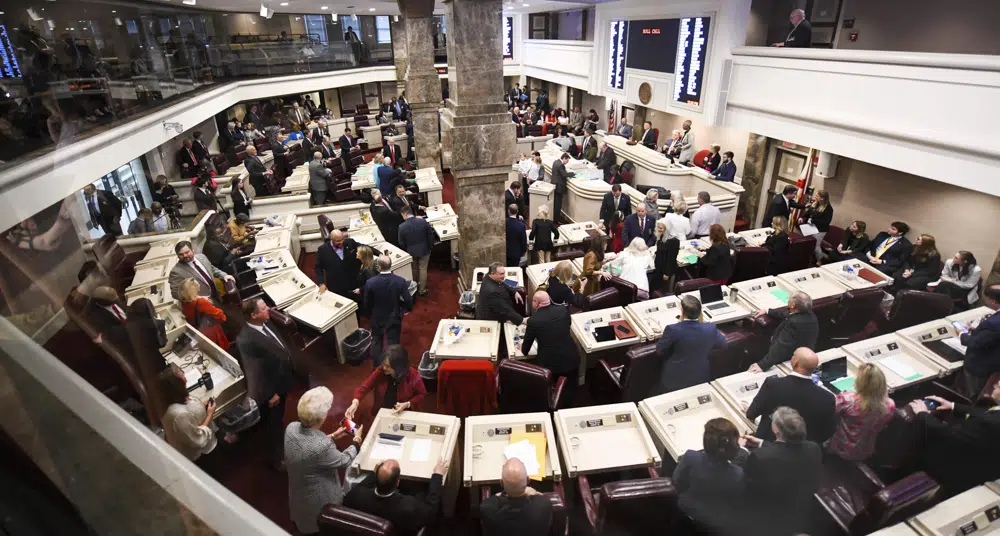
The Alabama House of Representatives passed legislation on Tuesday allowing retired state and local government workers to come out of retirement and return to work for the state or a local government agency, making as much as $52,000 per year while still drawing their state retirement. House Bill 41 (HB41) is sponsored by State Rep. Rex Reynolds. Reynolds explained that state and local retirees who are collecting their Retirement System of Alabama (RSA) benefits can already do this, but the law allowing them to do so capped their compensation at just $30,000. That has risen over time to $37,000. This legislation would raise the amount of money they can be offered to $52,000. “This does not mean that they have to make all of that,” Reynolds explained. “This would apply to law enforcement, corrections, educators, everybody,” Reynolds said. Reynolds acknowledged that there is opposition to this bill. “They want to hire new employees,” Reynolds said. “I am for that too, but the workforce won’t allow that.” Opponents object to a worker retiring, drawing his RSA retirement benefits, and then going back to the state to draw a second check from the state treasury. “They can already do that just by crossing a state line,” Reynolds said. “They are already trained.” Reynolds said that all state agencies are having difficulties recruiting workers in this labor force. HB41 passed the Alabama House of Representatives by a vote of 104 to 0. Reynolds is the retired Huntsville police chief. He chairs the powerful House Rules Committee. The legislation now goes to the Senate, where the bill failed to advance last year. Sen. Sam Givhan has introduced a Senate companion bill. That bill was halted in committee when both budget Chairs, Sen. Arthur Orr and Greg Albritton, blocked the bill from coming out of the Senate Finance and Taxation Committee. They expressed concerns that this could encourage more employees to take retirement, which could cause stress to the state retirement fund and future budgetary complications. Tuesday was the fifth legislative day of the 2023 Alabama Regular Legislative Session. The Alabama Constitution limits the length of a legislative session to no more than thirty legislative days. The unemployment rate is just 2.5%, but Alabama has very low labor force participation. To connect with the author of this story or to comment, emailbrandonmreporter@gmal.com.
Alabama Legislature returns for session today
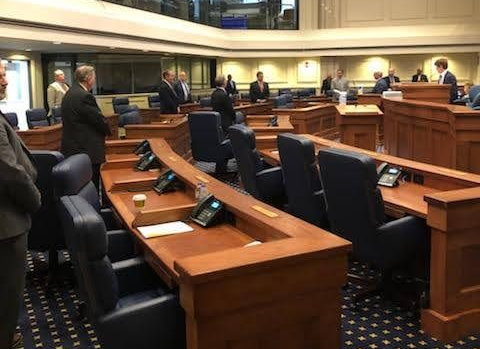
The Alabama Legislature will be back at work in Montgomery Tuesday after taking off last week for spring break. Both Houses of the Alabama Legislature will be in session, with the Alabama House of Representatives going into session at 1:00 p.m. and the Alabama Senate going in at 2:30 p.m. As of Tuesday, the Alabama House of Representatives has not released a proposed special order calendar for what bills it will work on in Tuesday’s session. The Senate has not posted a new special order calendar. The Joint Committee on Public Accounts will meet on Tuesday at 12:30 p.m. in the Senate’s Finance and Taxation committee room on the eighth floor of the Statehouse. The committee has not posted an agenda. The Senate County and Local Government Committee will meet at 1:00 p.m. in the same room. There are two bills on the posted committee agenda. Senate Bill 92 (SB92) is sponsored by Sen. Josh Carnley. SB92 would extend the time to make a one-time lump-sum addition to the retirement benefits of certain retirees and beneficiaries of the Employees’ Retirement System and give local units participating in the Employees’ Retirement System the option to come under the provisions of the act. According to the fiscal note, “The provisions of this act would increase the obligations of any local entity making such election by an undetermined amount dependent on the cost of the bonuses issues, which must be borne by the local government, as provided by this bill.” Senate Bill 142 (SB142) is sponsored by Sen. Vivian Figures. SB142 would annex additional property into the Baldwin County city of Spanish Fort. The legislation is cosponsored by Sens. Greg Albritton and Chris Elliott, so all three of Baldwin County’s Senators support this legislation. Elliott chairs the committee. The Senate Healthcare Committee will meet at 1:30 p.m. in Room 304 of the State House. Two bills are on the Committee agenda. Senate Bill 109 (SB109) is sponsored by Sen. Linda Coleman-Madison. SB109 would further provide the scope of practice of licensees of the Alabama Board of Social Work Examiners. Senate Bill 28 (SB28) is sponsored by Sen. Tim Melson. SB28 would expand the scope of the practice of podiatry to include the treatment of disorders of the foot and ankle. Currently, Alabama limits podiatrists to feet only. There was a public hearing on this legislation on March 22. Alabama is one of the most restrictive environments for podiatrists in the country, making it very difficult for podiatrists to practice in Alabama. Most of our neighboring states already allow podiatrists to treat the ankle. The doctors’ lobbying group, the Alabama Medical Association, has opposed expanding the scope of practice for podiatrists for years. Melson chairs the Senate Healthcare Committee. Tuesday will be day 5 of the 2023 Alabama Regular Legislative Session. To connect with the author of this story or to comment, email brandonmreporter@gmail.com.
Alabama bill would limit prison release for good behavior

Incentives for some Alabama prisoners to follow the rules in order to secure an early release would be restricted under legislation that advanced in the state Senate on Wednesday. The bill slashes the amount of “good time” inmates can receive and also says inmates who commit certain offenses while in prison, including escape and sexual assault, would forfeit all of their accrued time and would be prohibited from earning any more. The Alabama Senate Judiciary Committee voted 9-4 on Wednesday to advance the bill to the full Alabama Senate, which could be voted on as soon as Thursday. Some lawmakers argued that although changes are needed, the legislation is an overcorrection and would worsen the crowded conditions in the state’s prison. About 12% of state prisoners are now eligible for “good time” incentives. Certain inmates sentenced to 15 years or fewer can earn up to 75 days of credit for every 30 days of good behavior. The bill is named after Brad Johnson, a sheriff’s deputy in Bibb County who was shot and killed in 2022. Austin Hall, the man accused of killing Johnson and shooting another deputy, had been released early from prison under good time incentives, despite escaping from a work release center in 2019. Hall served less than four years of a nearly 10-year sentence for theft, according to state records. “His killer should have been behind bars,” said the bill’s sponsor, Sen. April Weaver. The Republican from Brierfield addressed the committee while holding a photo of the slain deputy. Johnson was shot not far from Weaver’s driveway, and the senator’s husband, an emergency room physician, rushed to try to save him. Democratic Sen. Rodger Smitherman of Birmingham said good behavior incentives encourage prisoners to follow orders — otherwise, they “would have nothing to lose.” “This bill is going considerably overboard to address an individual problem we need to look at and correct,” Smitherman said. The committee rejected a suggestion by Republican Sen. Greg Albritton of Atmore to delay the implementation date. Albritton said most prisons consist of crowded dormitory-style housing in which inmates sleep in large open rooms filled with beds. “We don’t have room for people,” Albritton said. Hall, the suspect in the deputy’s shooting, could have had his good time credit revoked for the 2019 escape, but he never returned to state custody afterward, the Corrections Department said in an email last year. Instead, he was held in local jails and eventually released on bond. He has been charged with capital murder for Johnson’s killing and is being held without bond. Gov. Kay Ivey issued an executive order in January putting uniform rules on the use of good time and seeking better communication among law enforcement agencies. Republished with the permission of The Associated Press.
Senate leaders reflect on successful special session

On Thursday, the Legislature passed, and the Governor signed both bills, which were the objectives of the First 2023 Special Session. As the Governor requested in her state of the state speech on March 7, the Legislature appropriated $1,060,000,000 in American Rescue Plan Act (ARPA) funds in House Bill 1. The Legislature also appropriated money to finally repay the money borrowed from the Alabama Trust Fund (ATF) to make up for a shortfall in the state general fund (SGF) during the Great Recession. “It’s been our responsibility at the state level to appropriate this $1.1 billion for the benefit of the people of Alabama,” said State Senate President Pro Tempore Greg Reed. “We have been able to move through that process this week. All the membership has been very involved and engaged.” Priorities included investing in sewer and water infrastructure, broadband internet expansion, and supporting hospitals, nursing homes, and other health care providers across the state. “One of the things that we wanted to look at, of course, was hospitals, nursing homes, those that were providing care during the pandemic, which was very important. They had a lot of reimbursable requirements,” Reed explained. “Also looking at water, sewer projects. Basically, if you’re looking to invest in Alabama, you’re trying to put infrastructure in the ground that’s going to be there for the next 30, 40, 50 years. That is going to be very important for the people of our state. We did that in the first round of ARPA. We are doing that again. There is going to wind up being hundreds of hundreds of millions of dollars of infrastructure investment in our state.” The plan allocates $400 million to water and sewer projects, $339 million to healthcare costs, and $260 million to expand access to broadband internet. The remaining $55 million in funding will be eligible for those that serve food banks, child welfare, long-term housing, victims of domestic violence, mental health disorders, and senior citizens. The healthcare funding will be divided to include $100 million for hospitals, $100 million for nursing homes, $5 million for state veterans’ homes, $40 million for the state employees’ health insurance program, and $40 million for the public education employee’s health insurance program. Mental health services will receive $25 million, while $9 million will promote telemedicine. $20 million will go to a voluntary clinical trial and healthcare research program. “Broadband internet access, which is a huge issue for Alabamians. Trying to make sure that everybody across that state can access the internet,” Reed said. “That helps us in quality of life, but also as far as topics of economic development and healthcare with telemedicine; and of course, as we learned during the pandemic, our children’s education sometimes needs to be done from home, and that gives us the opportunity to grow that opportunity as well. We worked diligently to make sure this is a bipartisan effort. There are elements all across Alabama, no matter where you are, that will benefit from these ARPA funds.” “I make it my business to work closely with my colleagues in the Minority Caucus,” Reed stated. “I have a great friendship with Senator [Bobby] Singleton, who is my minority leader. He and I are great buddies. We work closely and carefully together. This is a topic, sometimes we disagree, as you would expect, but in this instance, there was a lot of collaboration, cooperation where we thought Alabama would benefit the most in being able to use them the most, so I am proud of that.” The Senate amended the House version of the bill to allow a portion of the money for water and sewer projects to be used for stormwater drainage projects. Of the water and sewer funds, up to $100 million are to be awarded based on a ranking system established by the Department of Environmental Management that includes a factor for the water and sewer needs of growing communities. State Senator Greg Albritton chairs the Senate Finance and Taxation General Fund Committee and carried both bills in the Senate. “We believe that we have allocated these funds to the best of our ability at the guidance of the Federal government,” said Albritton. “Water and sewer, broadband expansion, and healthcare were the backbone of this round due to no lost revenues. Our foremost intent was to make smart and intuitive investments in these critical infrastructure areas that will pay dividends for generations to come.” The Legislature passed Senate Bill 1, which transfers $59.9 million from the SGF budget to the ATF. The ATF was created as a ‘rainy day’ account to be used only in times of fiscal crisis and is funded by royalty payments that are received monthly from oil and gas companies. In 2012, the ATF transferred $437 million to the SGF to help with proration. The financial crisis that the Alabama Legislature found itself in after the Great Recession decreased SGF revenues by $300 million a year. “During those years, amid a national recession, we had a significant shortfall in funds,” Albritton explained. “It was the Legislature’s responsibility to fill the gap of the General Fund and keep Alabama operational. To overcome these critical shortfalls, the Legislature went to the Alabama taxpayers to seek their approval through a constitutional amendment to authorize the use of monies from the Alabama Trust Fund.” In 2013, the Legislature took action to repay the debts with The People’s Trust Act which implemented a schedule of repayments of the amounts transferred from the ATF. With the assistance of the Deepwater Horizon BP Settlement Funds and the State of Alabama’s annual disbursements, the total amount repaid to the ATF to date is $377.3 million. This one-time appropriation from surplus general fund dollars from the fiscal year 2022 will pay off that debt. “This final payment to the Alabama Trust will make us ‘debt-free’ and fulfills our obligation to the citizens we represent,” stated Sen. Albritton. “When this money was initially borrowed, we made a promise and commitment to pay it back. I am glad to say that due to our fiscal conservative
Cost estimate on new Alabama prison jumps $300 million

An Alabama prison finance authority on Wednesday increased what the state can spend on building a new 4,000-inmate prison in Elmore County after inflation and design changes have caused cost estimates to rise, a state official said. The Alabama Corrections Institution Finance Authority voted to increase the authorized spending on the project from about $623 million to $975 million. Alabama Finance Director Bill Poole said the change was needed after inflation and design alterations increased cost projections. “Can you spell inflation?” Republican Sen. Greg Albritton, a member of the authority, said when asked about the increase. “Every construction project that we have that is ongoing is experiencing this same phenomenon.” Alabama lawmakers in 2021 approved a $1.3 billion prison construction plan that tapped $400 million from the state’s share of American Rescue Plan funds to help build two super-size prisons, including the one in Elmore County. Another prison is planned to be built in Escambia County. The move drew criticism from congressional Democrats at the time, who said the pandemic relief money was not intended to build prisons. The prison in Elmore County will house at least 4,000 inmates and offer space for medical and mental health care treatment. Alabama officials last year signed a $623 million contract with Caddell Construction Co. for the construction. Poole said that the initial cost estimate was “based on very early design.” “We’ve increased, for instance, the education and vocational space. There have been other scope and parameters that have changed. Inflation has had a significant impact on construction costs, as is seen across all economic sectors,” Poole said. He said the state should have a final price this summer. Albritton said he believes the construction project is the best option for the state despite the increase in cost. “The prisons that we’ve got are falling apart. We’ve got to do something. It’s better to execute the plan that we’ve got than try to start over,” Albritton said. The prison construction plan has been criticized by some members of the Alabama Legislature. Alabama lawmakers are meeting in a special session to decide how to use the remainder of money the state received from the American Rescue Plan. Democratic Rep. Juandalynn Givan said during debate Tuesday that the state has many needs that could be helped by the relief dollars, but lawmakers instead spent hundreds of millions of dollars for “prisons that we haven’t built yet.” Republished with the permission of The Associated Press.
Legislature finishes the ARPA special session

On Thursday, the Alabama Senate voted to pass House Bill 1 (HB1), which appropriates $1,060,000,000 in federal American Rescue Plan Act (ARPA) funds for water projects, broadband, healthcare, and other projects. Following Senate passage, the Alabama House of Representatives voted to concur with the changes made by the Senate, and the bill has been sent to the governor. HB1 was sponsored by State Representative Rex Reynolds and was carried by Sen. Greg Albritton. The state has received approximately $2.1 billion in ARPA funding from the federal government. Half of that money has already been appropriated by the Legislative and is in the process of being allocated by the executive branch to projects across Alabama. This second tranche of ARPA money includes about $339,175,000 that will go for healthcare needs, including $25 million for Mental health and $9 million for the expansion of telemedicine. $260 million will be used for broadband, including a cybersecurity component. $395 million will go to water and sewer projects. $55 million will be used to compensate state agencies for the negative impacts of the COVID-19 pandemic. $1,179,000 will go for administrative costs of overseeing and allocating the money. State Sen. Arthur Orr said, “I don’t see what a lot of this has to do with COVID, but I can also see when a train is coming. “We have also got $55 million that can be for food assistance for food banks and nutritional programs,” Orr said. “I appreciate all your hard work on both of these ARPA bills,” Orr said to Albritton. “I think if we never have another ARPA, you would be happy with that.” “It does not fully fund the PEEHIP assistance, which is why the fed passed the original assistance bill,” Orr said. The full Senate voted to adopt the committee amendment introduced Wednesday for Sen. Chris Elliott. Sen. Linda Coleman-Madison offered a floor amendment to the bill. Coleman Madison said, “I would like to know why in-kind contributions was left out. It saves money from contracting out. It saves time. It helps the money go further.” “All of these moneys are under very strict guidelines by the federal Treasury Department,” Albritton said. “If we allow an in-kind contribution that opens up a means of reporting that may become problematic,” Albritton said, “We are talking about the $395 million for water and sewer projects. That is less than 40% of the total ARPA money.” “I ask that you withdraw the amendment,” Albritton said. Coleman Madison said, “I do not want to do anything where the federal government will come back and require a clawback. They want money and not any kind of service. I would like to withdraw my amendment.” Albritton provided a breakdown of the water and sewer dollars in the bill as amended by Elliott’s committee amendment. · $195 million is for water and sewer. · 100 million is water, sewer, and stormwater and may have, but does not require a match. · $100 million in water, sewer, and stormwater and does require a match “Every county in the state will have an opportunity to apply and will actually get funding for a project in their county,” Albritton told the members. “Counties across this state got $495 million directly to counties, and some of them chose to do nothing about stormwater with it,” Senate Minority Leader Bobby Singleton said. “Now they come to us and want us to fix it for them.” State Sen. Rodger Smitherman proposed an amendment to require ADEM to work with a town or county whose application was denied due to an error on the application. “This is simply to help our small towns,” Smitherman said. “If you are in a metropolitan area, you probably have someone who can do this, but our small towns cannot afford that.” “It has already been done,” Albritton objected. “That was in ARPA one. I hesitate to put that language which is already occurring in statute. I am going to vote no on this. We have already added one amendment. I don’t want another amendment one. It raises the possibility of nonconcurrence.” Smitherman’s amendment passed over Albritton’s objection 29 to 1. State Sen. Will Barfoot applauded the members for providing funding for healthcare but urged the members to do more for rural healthcare in the regular session. “I am challenging each of you here to start looking at bills to address healthcare in our rural communities,” Barfoot said. Senate Pro Tem Greg Reed said, “We have to stay focused on rural healthcare.” “We are going to have several pieces of legislation addressing nursing,” Reed said. “A lot of areas in my district, we would not have healthcare if we did not have nurse practitioners.” Reed said that broadband expansion is part of healthcare because of telemedicine. “The technology is advancing tremendously,” Reed said. “That is one way that local hospitals will be able to stay in business. We need to find ways to increase healthcare benefits, particularly in rural places like in my district.” State Sen. Vivian Figures said to Albritton, “Thank you for making sure that the cities and counties that can’t afford to put up a 35% match will be able to do these projects as well.” “I want to thank you for all the work that you have done,” Singleton said to Albritton. “It is a lot of money to spend. We have a lot of needs, but we are beginning to see a difference in the state. We are not going to be able to get it all, but we are knocking a dent in it.” “I wish you could have set aside more of the money for rural hospitals like we did in the first round,” Singleton said. “When that $40 million was cut out for them in the last round, they were ecstatic.” Reynolds asked that the House concur with the Senate changes to HB1. “The second amendment requires that ADEM has to work with a system if an application is denied because of an error,” Reynolds explained. “That system has to have an opportunity to correct that error, and if that application is denied, it has to be
House Committee approves bill to pay off debt to Alabama Trust Fund

On Wednesday, the Alabama Housed Ways and Means General Fund Committee advanced Senate legislation, SB1, to pay off the final balance on a debt that the Legislature borrowed from the Alabama Trust Fund. Senate Bill 1 is chaired by State Sen. Greg Albritton. State Representative Rex Reynolds chairs the committee. “I expect this to go quick as this committee passed the same legislation as a House Bill last week and passed on the House floor,” Reynolds said. “Since I am carrying the bill, I will turn over this to my Co-Chair, Rep. [Kyle] South.” Rep. Kyle South asked that the bill be brought up. Reynolds said, “SB1 is the exact same bill as HB2. It appropriates $59,975,672 to pay off the balance owed to the Alabama Trust Fund. It is what we committed to under the People’s Trust Act.” The bill received a favorable report, and the committee adjourned. The full House can consider SB1 as early as Thursday. The Senate passed SB1 on Tuesday. The House also passed its trust fund debt bill, HB2, on Tuesday. The Alabama Trust Fund is funded by revenues from the state’s oil and gas leases. It serves as the state’s savings account. A portion (69%) of the investment revenue from the Alabama Trust Fund is used to fund the state general fund (SGF). The remainder of the ATF revenues also funds cities, counties, Forever Wild, and senior services. State SGF revenues dropped from approximately $2.1 billion a year during the Great Recession to $1.6 billion. Once all the reserve fund and federal emergency bailout funds were exhausted, and budget cuts were made, state Legislators were left with the difficult decision. They could release thousands of state prisoners and/or cut benefits for hundreds of thousands of Alabamians who get their healthcare from Alabama Medicaid (which would have resulted in a federal lawsuit). Alabama Medicaid and the Alabama Department of Corrections are the two largest agencies funded by the SGF. Voters in 2014 approved a plan by legislators to raid the $3.2 billion Alabama Trust Fund to avoid devastating general fund cuts The ATF balance was $2,430,232,27 in 2015. As of September 30, 2022, the balance declined by $767 million due to investment downturns to $3.1 billion. The ATF distributed $197.4 million in FY2022. The Senate Finance and Taxation General Fund Committee, chaired by Albritton, met on Wednesday and gave a favorable report to the American Rescue Plan Act appropriations bill, HB1, which appropriates $1,060,000,000 in one-time federal dollars given to the state by Congress. The committee did not take up HB2, so at this point, it appears that SB1 will be the trust fund repayment bill that is best positioned for passage. The full House can now consider the legislation as early as Thursday. The Alabama Legislature is currently in its First Special Session. It is hoped that the body will be able to resume the 2023 Alabama Regular Session on Tuesday, March 21. To connect with the author of this story or to comment, email brandonmreporter@gmail.com.
Alabama Senate Committee amends ARPA funding bill
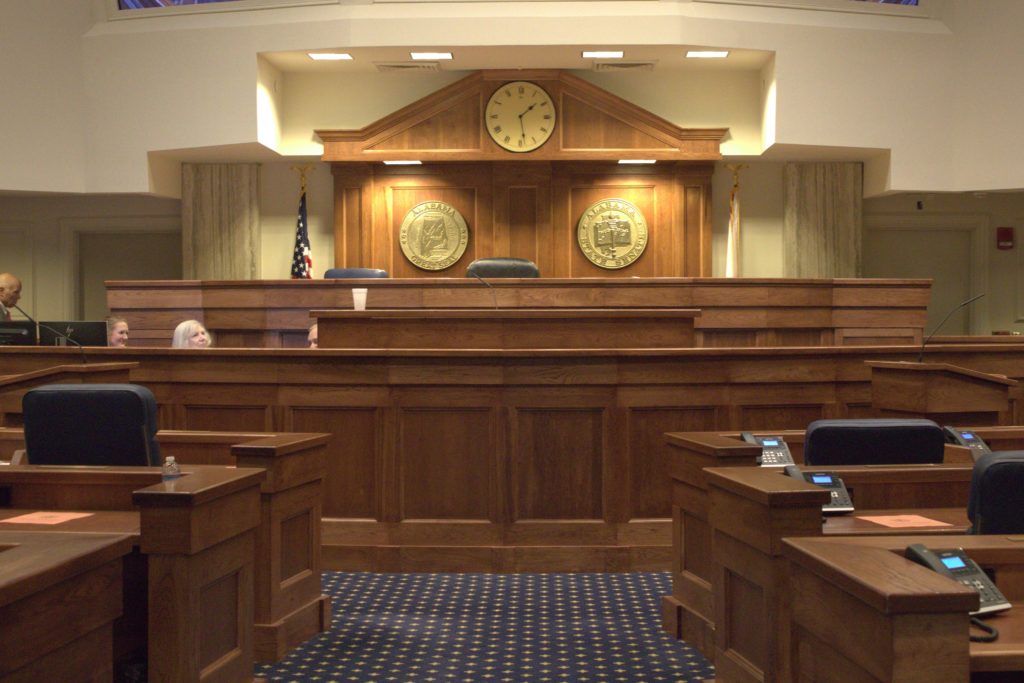
The Alabama Senate Finance and Taxation General Fund Committee met on Wednesday morning to consider the American Rescue Plan Act appropriation bill passed by the House on Tuesday. The Committee voted to give the legislation a favorable report but only after amending how the sewer and water funds are distributed. House Bill 1 (HB1) is sponsored by State Rep. Rex Reynolds, who chairs the House Ways and Means General Fund Committee. The legislation appropriates the second $1,060,000,000 that the state received from the federal government through the controversial ARPA Act – all of which are paid for through federal deficit spending. State Sen. Greg Albritton chairs the Senate Finance and Taxation General Fund Committee. Albritton shared two documents with the members of the Committee. The first was an email from the Alabama Department of Environmental Management (ADEM) outlining where the first round of ARPA money for water and sewer projects has been allocated. “This data is also available online,” Chairman Albritton said. “The second is the MOA (Memorandum of Understanding) between the Department of Finance and ADEM on the distribution of that money.” “HB1 is the ARPA document,” Albritton said. “It passed the House 101 to 3.” Sen. Chris Elliott presented an amendment to HB1. Elliott explained that his amendment further defines the use of the water and sewer projects portion of the ARPA funds to include stormwater projects. The amendment also sets aside up to $100 million for the water and sewer projects to require matching grants of up to 35% and includes changes to the formula to factor in for growing communities. “It allows this money to be used for stormwater infrastructure,” Elliott explained. “It further stretches this money out by requiring matching grants from local communities.” $395 million of the ARPA will go to water and sewer projects. ADEM will award the projects to water and sewer systems that apply for the funds. State Sen. Linda Coleman Madison said, “I had an amendment to add, but your amendment includes that. What is the difference between the two amendments?” Albritton said, “It includes that and goes further to delineate that a portion of the money requires a 35% match.” The Elliott amendment was adopted by a 15 to 0 vote. “I know Sen Coleman Madison calls me Senator No,” said Sen. Sam Givhan. “It’s better, but it’s still not there yet.” HB received final passage by the Committee, with 12 members voting in favor and three members, including Givan, voting to abstain. The full Senate can now consider the legislation as early as Thursday. If the legislation passes the Senate with the Elliott amendment, it would have to go back to the Alabama House of Representatives for them to consider the changes. The Alabama Legislature is currently in its First Special Session. It is hoped that the body will be able to resume the 2023 Alabama Regular Session on Tuesday, March 21. To connect with the author of this story or to comment, email brandonmreporter@gmail.com.
Alabama Senate passes legislation to pay off debt to Alabama Trust Fund
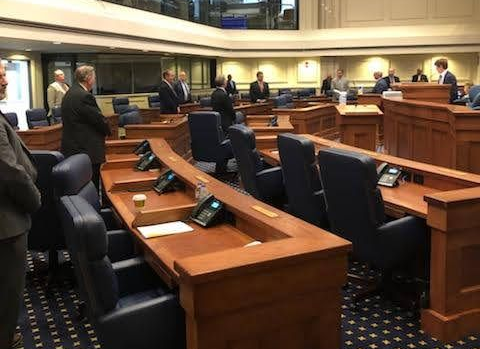
On Tuesday, the Alabama Senate passed legislation that would authorize a supplemental appropriation to pay off the remaining balance the state owes to the Alabama Trust Fund, which was raided almost a decade ago by the Legislature to make up for what was then a significant shortfall in the State General Fund (SGF). Senate Bill 1 (SB1) is sponsored by State Senator Greg Albritton. Albritton is the Chairman of the Senate Finance and Taxation Committee. “This is not even one page,” Albritton said. “This is one paragraph, as we are paying off the Alabama Trust fund.” Sen. Clyde Chambliss said, “I grew up in Prattville. My father taught me that you take care of your debts. You pay off your debts and try not to accumulate debts. Sometimes though, you need a helping hand, and we had that situation during the Great Recession.” “This is part of the historical process to pay off that debt,” Albritton said. “Fortunately, we owe it to ourselves. Thanks to the people that went before us and set up the trust fund. Then we were $250 million in the hole and trying to find money.” “I didn’t want us to gloss over and pass this without pointing out what we have achieved,” Chambliss said. “Frankly, there were ways we could have gotten around this and not pay this.” Albritton said, “It was thought about.” Sen. Rodger Smitherman said, “I am with you 100% for what you are trying to do with this bill.” “We got all this money in the general fund,” said Smitherman. “We got plenty of money. It is about time for us to come up with 10 or 12 million to fund all of our needs for judges. We have got a real-life need for the state of Alabama.” Smitherman said that the judges would pay for themselves by completing the backlog of cases and generating court costs and fines. “We are going to make four times that off the court system if we have the judges in place to hear those cases,” Smitherman said. “I am with you 100% on paying the money back.” “I look forward to all of us seriously addressing that to try to solve the needs problem that exists in all of our circuits,” Smitherman said. “I look forward to voting with you on this bill.” The funds to pay off the debts will be paid with a supplemental appropriation from surplus funds from the 2022 fiscal year that ended on September 30. SB1 passes the Senate by a vote of 33 to 0. The Alabama House passed similar legislation earlier in the day. House Bill 2 (HB2) is sponsored by State Representative Rex Reynolds, who chairs the powerful House Ways and Means General Fund Committee. The bill appropriates $59,997,772 to pay off the remaining debt owed to the Alabama Trust Fund. “This is a good bill. This body knew that this was the time to pay those bills,” Reynolds said. The House passed HB2 104 to 0. Ninety-four members cosponsored the bill. HB2 passed the House 103 to 0. The Senate Finance and Taxation General Fund Committee will meet at 9:00 a.m. to consider an appropriations bill, HB1, to appropriate $1,060,000,000 of American Rescue Plan Act funds. The full State Senate will meet at 1:00 p.m. The Legislature is currently in a special session called by Alabama Governor Kay Ivey to deal with appropriating the ARPA funds. To connect with the author of this story or to comment, email brandonmreporter@gmail.com.
The ARPA Special Session begins
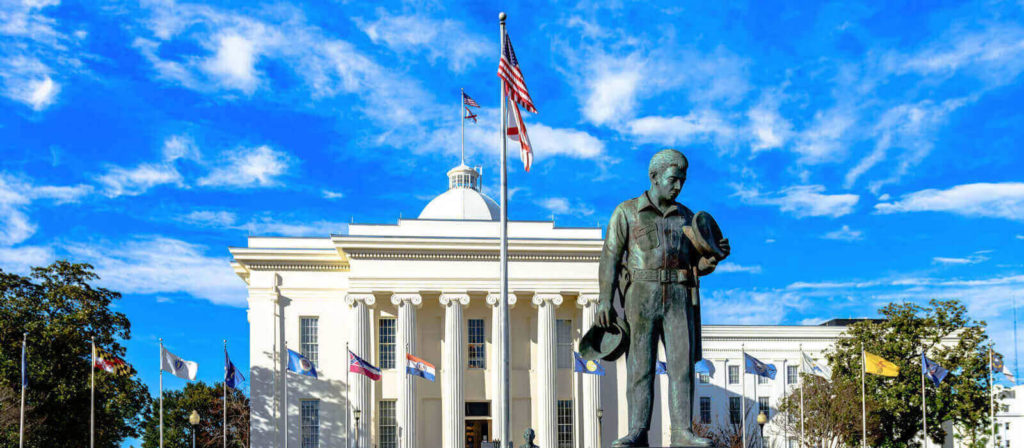
The Alabama Legislature met on Wednesday for the first day of the First 2023 Special Session. The session was called by Alabama Governor Kay Ivey to appropriate just over one billion dollars in American Rescue Plan Act (ARPA) funds that the state received and has not yet appropriated. The Alabama House of Representatives met at 1:00 p.m. to conduct business and allow for the introduction of bills in the special session. The pre-filed bills we have been discussing for weeks are for the 2023 Regular Legislative Session and cannot be addressed during the special session. The regular session will resume on Thursday, March 21. House Speaker Pro Tem Chris Pringle introduced, and the House passed, a resolution to formally announce to the Senate that the House is in special session. The House passed a resolution to appoint a committee to announce to the governor that the House is in a special session. The Alabama Senate gaveled in just after the House adjourned. The Senate appointed a committee to announce to the Governor that the Senate is in special session. They also passed a resolution to announce to the House of Representatives that the Senate is in session. Many of these rules and procedures may sound redundant, but in 1901 when the Alabama Constitution was written, no one had cell phones, the internet had not been invented, and most people in the state still did not have telephones or electricity. These rules exist so that a legislative body is not meeting in secret without informing the other legislative body or the governor of its activity. State Sen. Greg Albritton addressed the body about the proposed bill to pay off the money that the state owes the Alabama Trust Fund. “A few years back, the Legislature ran into a problem, and there was a significant shortfall in funds,” for the state general fund (SGF) Albritton explained to the Senators. “We had to go to the people to seek authority to borrow money from the Alabama Trust Fund.” “We borrowed over $400 million to keep the government operational,” Albritton said. “We stated that we had a moral obligation to pay that money back.” “At the time, there was a lot of skepticism that we would never pay that money back,” Albritton said. “We have been paying $13 million a year out of the general fund. When times got better we began making double payments.” “The bill that I am introducing this afternoon, SB1, will pay that completely and totally off,” Albritton continued. “This bill will take $59,987 thousand and some change to pay that ATF off. When this was done that balance was approximately $2 billion and change. Today that amount is over $4 billion.” Senate Bill 1 has been referred to the Senate Finance and Taxation General Fund Committee chaired by Albritton. Senate Bill 2 by Sen. Garlan Gudger, dealing with Healthcare, has been referred to the Senate Committee on Healthcare. Both committees will meet on Thursday to consider these two pieces of legislation. Senate Pro Tem Greg Reed announced that the Senate will reconvene for Day 2 of the 2024 First Special Session on Thursday at 9:30 a.m. A joint session of the House and Senate will meet in the historic 1859 Alabama Capitol Building at 10:00 a.m. on Thursday to honor former U.S. Senator Richard Shelby for his decades of service to the state of Alabama. The House will then return to the Statehouse for its own session at 11:30 a.m. To connect with the author of this story or to comment, email brandonmreporter@gmail.com.


